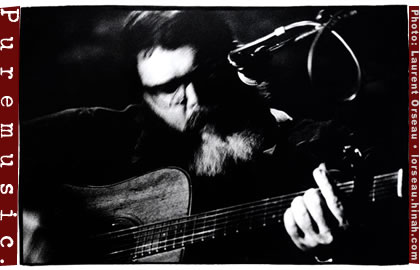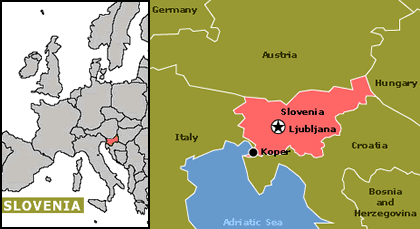
A Conversation with Robert Fisher of WGC (continued)
PM: Was Regard the End substantially different in any way without the influence of your longtime partner?
RF: Yeah, actually, in a very big way. I sort of leaned on Paul for all of the acoustic guitar and really the center of the music. I mean, his rhythm guitar was the thing--if you were to compare our music to a Christmas tree, a really nice Christmas tree that you put a bunch of ornaments on, then his guitar was the tree.
PM: Oh.
RF: When he decided to move to Seattle, it actually was a really positive thing for both of us. Not only was he able to do music that he'd been hearing for a while in his head, but it forced me to approach the guitar and--not play Paul's role, but a different role in the band, using the acoustic guitar. And one of the things I wanted to do after making four records with the acoustic guitar as the center of the music was to take it out of the center and allow other things to inhabit that place, including silence at times. So there's a major difference. And one of the big things is the learning curve that I've been going through over the last three years of trying to deal with not only singing and writing, but playing the guitar live and all the rest of it, which is something I hadn't done before. That makes a big difference.
PM: Absolutely. And in stepped--or apparently so--Simon Alpin, not just a co-producer, but a collaborator on many levels, and a real force on this record.
RF: Yes. Simon had actually started playing with us before Paul left, and we have an affinity--I mean, I've always collaborated with a lot of different people, so it's natural for me, and it's actually what I enjoy in music. I've done solo stuff, but I don't like it all that much. It's not something I'm really comfortable with. I think collaboration is more important to me. So it was a natural thing for Simon and I to start writing together.
Actually, the way this record happened was sort of like the first record. It was by accident. We were on tour in Europe and we'd just done a week in Mallorca where we had done two festivals and had some time off in between.
PM: Damn.
RF: I know, it was hard duty.
[laughter]
RF: And the promoter had put us in this beautiful farmhouse. On the second floor it had this incredible patio that was about the size of most two-bedroom apartments, I'd guess.
PM: Wow. [laughs]
RF: And so we'd sit out there late at night, after we'd came in from doing whatever, and just played music until about 5:00 in the morning when the roosters started crowing and told us to go to bed. By the time we got to Slovenia, where we had two festivals with a handful of days off in between, I knew that I didn't want to sit around again. So I talked to Chris Eckman, who lived in Ljublyana and is the songwriter for the Walkabouts, and I asked him if he knew any studios we could go into and have some fun messing around. And he said, "Yeah, I know exactly the one."
So we booked it, and we went in. And within a matter of a day or two--Chris was there with us--within, really, the first day, I guess, we knew that we had started the record. We didn't intend to, it just happened that way, the magic of all the elements that went into it. And so it was a natural thing for Simon and I to start writing together as we were sitting around wondering what we were going to do the next day in the studio.
PM: And who was the cat in Slovenia that had the place and the gear and the ears?
RF: Well, this is an amazing studio. It's called Studio Metro, and people could actually find it on the web, there's a website for it. It's a beautiful studio, it's all handmade. It's maybe the best studio I've ever worked in. I've worked in some nice studios, but this one just sounds remarkable.
PM: In Slovenia.
RF: Yeah, in Ljubljana.

PM: That's really something. I remember we were playing somewhere in Europe, and we crossed the bridge to Slovenia because my brother wanted to get some cigarettes from there, but that's as much as I--
RF: [laughs]
PM: --saw of that place. So I was really amazed when I read that this was recorded--where? In Slovenia, no less.
RF: Yeah, it's a country that I love. It's a remarkable place. There are only two million people. Slovenia is a very small part of the former Yugoslavia. But it borders the Adriatic to the South, and Italy and Croatia, and in the North it borders Hungary and Austria. So in this very small country you've got all these different things you can access. The Adriatic/Italian feel, and then the Hungarian and the Hapsburg Empire sort of thing, with lakes and pine forests and all of that, and the Alps, et cetera. And then there's the Eastern European thing from Croatia and Yugoslavia, and all the Balkan stuff that enters in. So it's a very interesting place, and very special.
PM: Wasn't there a Willard Grant record on Glitterhouse called The Green Green Grass of Slovenia?
RF: Yeah. That's actually a mail-order-only record, and it's a document of a live tour that we did with the Walkabouts. The second to the last show of the tour was in Ljubljana. During the tour we had very close ties to the Walkabouts, and during the tour they would join us during the set. That particular record came from a radio broadcast that we did in Ljubljana. We had a radio truck and all of that, a sound truck. And it was great, because it was a document of the spirit of the tour, I think. And I think it's a special event for all of us.
PM: Now, one of the trademarks and the real perks of working with Glitterhouse, at least for some of my friends, has been that there is kind of a booking arm, or an associated agency that really helps their artists get around Europe. Has that been your experience?
RF: Well, no. I've known the guys at Glitterhouse for a really long time, but this is the first record where they've actually put out, like, a real release for us. Everything else has been the mail order thing or something like that. And I already have a network of people that I work with in Europe for booking and things. So that hasn't really been a part of our relationship. But I have to say that I know what you mean, one. And two, Glitterhouse is just a remarkable label in general. It's like they treat all their bands like their family. And even when we weren't their band, even when we were on Rykodisc, they would treat us like we were theirs anyway. They would put our tour dates in their catalog [laughs] and on the website, and all that kind of stuff.
PM: Wow.
RF: So when it came time to look for a label to handle Europe, it was really a no-brainer. We were actually at Chris Eckman's wedding in Ljubljana when Reinhard and I talked about the new record, and I gave him a rough mix of it. And he e-mailed me about 48 hours later to say, "Let's do this now." So it was just a no-brainer, because we'd had a long history, anyway.
When I separated from Ryko, we also were really lucky in the UK to hook up with Loose Music, which is another really fine independent label. And then here in the States, Kimchee--it's interesting because the two guys who run Kimchee are two fellows that I've known for about 20 years now. One of them was one of the first DJs ever to play a band that Paul and I had together. That was about 20 years ago. So all around it's kind of a family thing, which is great.
PM: Wow, that is amazing.
RF: Yeah.
PM: Although there are many great tracks, some of my favorite ones--outside of the lead vocals which I like very much--are the background vocals and the trumpet.
RF: I love the trumpet, yeah.
PM: Were they all overdubbed at T.W. Walsh's place in Medford?
RF: Yeah. The way it happened was I brought all the tapes back from Ljubljana. We actually did two sessions in Ljubljana, about four months apart. And then I brought everything back from there. And Tim had his own little garage studio, and I left it with him while I was on tour in the U.S. And members of the band would just go out and sort of react to what was on tape and lay their parts down. I don't think anybody did more than two passes, in terms of overdubs--in fact, I'm sure of that. And so every time I would come home from whatever touring I was doing, it was kind of like Christmas. I'd be like, "Well, Tim, what happened to the record while I was gone?"
[laughter]
PM: Oh, what fun.
RF: It was great. I remember getting this e-mail, while I was on the road, from Jess Klein, and she said, "Robert, I hope it's okay, but I went out there to sing on two songs, and I ended up singing on seven because I just fell in love with the way it sounded." And I was like, "Oh, I'm sorry, no."
[laughter]
RF: I mean, it was just wonderful to have this way of working. And we were doing it slow, we were doing it on my budget, which was pretty, uh...
PM: Pretty low.
[laughter] continue
print (pdf) listen to clips puremusic home